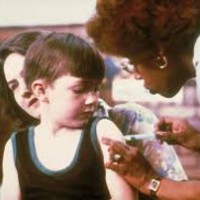Poll: U.S. adults favor vaccinating all children
- Details
- Published on Wednesday, 27 August 2014 15:59
- Written by PRNewswire
More than three-fourths of U.S. adults believe all children should be vaccinated, according to a new poll that is out when incidents for many diseases once considered dangers of the past are on the rise.
The new Harris Poll shows that 77% of U.S. adults favor childhood vaccinations being mandatory, while 69% don't think unvaccinated children should be allowed to attend either public or private schools. What's more, 89% feel it's important that children be vaccinated and 90% believe vaccinations should be provided for free to children whose families cannot afford them, said the poll based on surveys of 2,306 adults onlinebetween July 16 and 21, 2014.
For the most part, Americans appear to support such vaccinations, indicating they're an important safeguard against diseases that might be brought into our country from abroad (91%), that they are very effective at preventing diseases (89%) and that non-vaccinated children can represent a public health risk (83%).
Americans also, by and large, recognize there is at least a moderate danger that an unvaccinated child will contract a disease that vaccinations are designed to prevent (74%). They also recognize that a child contracting such a disease would present at least a moderate danger to other children in their proximity (64%) and such diseases represent at least a moderate danger to a child if they are, in fact, contracted (60%).
That said, with only one in four U.S. adults (25%) seeing a great deal of danger in a child contracting a disease vaccinations are designed to prevent, it could be that our years of safety from these afflictions have allowed us to forget the threat such diseases represented before vaccinations for them were developed. What's more, sizable minorities hold reservations about the safety of childhood vaccines.
While over three-fourths of U.S. adults (77%) believe childhood vaccines are either safe (34%) or very safe (43%), roughly two in ten (19%) believe they're either only a little bit safe (14%) or not at all safe (5%). Perceived safety also decreases among younger generations, with each generation progressively less likely to see vaccines as safe or very safe than their elders (68% Millennials, 76% Gen Xers, 83% Baby Boomers, 92% Matures).
Looking specifically at one widely publicized – and widelydiscredited– fear about vaccines, one-third of Americans (34%) believe that some childhood vaccines have been linked to autism.
Just under half (46%) of Americans are aware that the CDC recently announced that measles outbreaks had reached their highest point since 2000, with considerable knowledge gaps observed: two-thirds of matures (68%) are aware of this, compared with 48% of Baby Boomers, 41% of Gen Xers, and 38% of Millennials.
Among those aware of the rise in Measles cases, seven in ten believe it either very (36%) or somewhat (35%) likely that declining vaccinations in the U.S. have contributed to the increase in measles cases, while three in ten believe it's either only a little likely (22%) or not at all likely (7%) that this is the case. Baby Boomers (78%) and Matures (84%) are significantly more inclined than Millennials (64%) or Gen Xers (62%) to see this connection as very or somewhat likely.
Though seven in ten Americans (71%) disagree with the sentiment that, since most children get vaccinated, it's alright if some parents choose not to vaccinate their children, the three in ten who do agree with this statement (29%) believe it is alarming nonetheless as it overlooks the need to insulate those portions of the population ineligible for vaccines (such as infants and the immune-deprived). What's more, with Millennials (38%) and Gen Xers (37%) are roughly twice as likely as Baby Boomers (19%) and Matures (14%) to agree with this sentiment, the perception that it is acceptable for some parents to choose not to vaccinate their children is likely to spread and increase.


















































